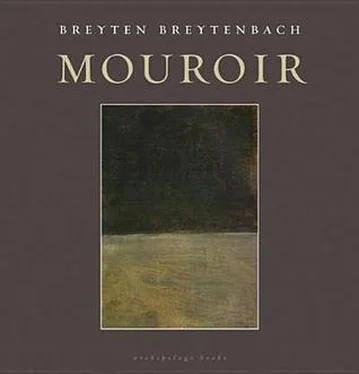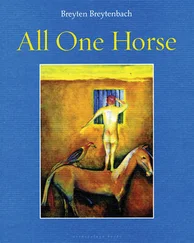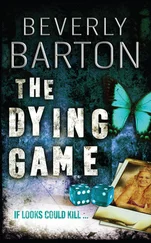In one respect this area was exceptional. Apart from the ubiquitous rats with their fulvous or blackish coats shiny with dew, there were also thousands of enormous white butterflies fluttering overhead, perching wherever they could with wings a-tremble, clean as unwritten and unthought thoughts. Their darting and hovering a series of sibilant letters.
Going down. Down we went into the cavernous interior. In the good old days some racists had squirted their slogans on the walls of the stairwell. BLACK IS BOUNTEOUS, and THE POPULATION EXPLOSION LIES HENCEFORTH IN THE LAP OF THE BLACKS. Or CAN A MAN TAKE FIRE IN HIS LAP AND NOT BURN HIS THE MUMMY? To which a wit had thoughtlessly added Jung’s squib as footnote — FOR WOE OH WOE — EE THE PENIS IS A PHALLIC CYM-BOL. But even these were flaking off, being obliterated by the insidious wetness, the caresses of passing butterflies. Our arrival was always raucously cheered and taunted by those already present. In a way those left behind were fond of my grandfather. Wasn’t he believed to be the seer? Some were students, young-faced once, gaunt and emaciated now. They sat on the stained concrete steps with sheets of white paper in their hands and these they would fold and refold and then agitate rapidly so that it looked as if each held in the fist one of the big pale insects.
The chorus would continue while we waited for our part of the dwindling daily pittance. Chant: “Mister Meschanin Mister Meschanin” — as my ancestor was called — “when will you let the Saints of Sin come in ah come in.” Or again: “Master hey master Do open your heart! Pour to us please Your new work o’ fart!” And often one of their number got up and recited, apropos of nothing I always considered: “I have been responsible for three murders — that of Wrench and Pitters and the African.”
Gradually the hubbub would die down. My grandfather sitting there unperturbed. Hand him something to eat. We would be handed something to eat, to sustain ourselves with. (The inner man.) Was that not after all the reason for our being there? Grandfather picking at the carrion with bony fingers. And eventually when everything was queer except for the brush of the butterfly multitude’s wings and the scurrying of bold rats — shiver-sound of disillusioned ex-students weaving their paper imitations, victims of star-vision — maybe the soundless shifting of water underfoot, inexorable — then my grandfather — and here I should certainly add that he had always abhorred the false-hearted with the prim lips camouflaging primed impurities, the oh- and the so-sayers, the Sunday-sainted scented scavengers — then my black grandfather would lift a manuscript page to the approximate level of his black lenses (which used to embarrass me as I knew his blindness as also his vanity) and declaim in a catacombic voice always the same lines — as if he were addressing the future — the now:
The circuses are empty;
There are no more loins about
And e’en the Christians are excreted. .
I may have emptied my eyes,
But my’air will grow again
Like chains.
There is a man who is very old. He is 46 years old. His hair is thinning and greying above the ears. His nose is high and shoorp and the skin over his face is folded carefully. His body is thin in a stiff dark suit. He sits at a table on the first floor. This is where he dines. Light is spread over the table, illuminating the diverse objects on it. (A skein of light holding the disparate together; rubbing out the whatness with too much light.) The kitchen, or perhaps just a workshop, is on the rez-de-chaussée . That is where his beloved works. Or that is where his beloved is keeping watch for him. He also has an enemy on the ground floor. The enemy would be named Mr Dove or some such name of a like sound. The very old man decides to kill his enemy before he, the antagonist, has a chance to do him in. He snaps his knotty fingers for the waiter. The waiter appears in the circle of soundlessly reverberating light. The man dips a wrist in a shimmering bowl and extracts a bottle of wine therefrom. He dispatches the waiter downstairs, committing to him the bottle of vino , instructing him in a breath-load of mumbled syllables to deliver this here (that there) to Mr ’Ove, with his perishing compliments. From the rich man’s table. A clatter of plates from down below. The waiter nods, bows, nods, flashes his cuffs, disappears down the steps. Maybe he also smirks. The wine, of course, is poisoned — the move by which the very old man intends to eliminate his adversary. The very old man listens with his hands whorled on the white table. Indistinct utterances float up from below. Then a shrieking which seems to contort the very air as if life-leaving lungs are clutching at noughting. His beloved dies from the poisoned potion. Now, what happened? Did the enemy somehow forestall and thwart his plans? Did his love intercept the gift for some obscure and subtle purpose? Did she assume it was destined for her? Did the waiter misunderstand his message? Is the waiter deaf? Was the waiter not perhaps ordered by his love to bring everything to her first? To protect whom? Did he mispronounce, lapsing into metonymy? Did he say anything? Did he really intend? Treachery? Treachery?
. . as if from a lost and aromatic night. .
L. LASARUS
In Paname we had the habit — Greg Somesome, Dan Espejuelo and Giovanna Cenami, K and his fiancée, Fagotini, Ganesh at times, Bricole le Tubard and myself — of gathering once a week at the house of Lamourt and his wife, Mooityd. It was no fixed rendezvous; it might have been on a Friday night and on other occasions again a Saturday afternoon or a Sunday when twilight comes shining. Each then brought a bottle of wine, pâté and a cut of cheese, or some or other exotic delicacy originating from a Greek island or the Far East — djalandji dolmas, almond cakes, currants — and Mooityd prepared her fine and nourishing and aromatic dishes. It is a time-slice I often think back on with much pleasure. Later, after Lamourt had practically vanished from the face of the earth and after some of us had become bridle-shy of any association with others (for association of whatever kind is by definition subversive), our little group also disbanded and we were scattered to the four winds of the mirror. In any event, we never formed a “salon” or anything along those lines. But in life, which already is not very long or cheerful, one should honour the good entr’actes as the ant would hide the haystalk in memory of summer, one should cherish them and lay them by as souvenirs the way earth-dwellers of earlier ages always walked with a fragrant fruit, a spice ball, a pomander in the hand — the orange full of cloves which allows it to shrink but prevents it from ever rotting and gives it a lovely odour: to parry the stench of primitive sanitation and decaying cadavers and pornographic manuscripts. Or the pot-pourri, a saucer of flower petals left on a table to ward off the pest-fumes and other plagues blown along by the warm winds from the south. But you must fully realize that this hiatus can only be of brief duration and you must not try and cling to it. You must especially know what I mean. That which is gratifying and civilized you should let run through your fingers just like the bad and the unpleasant. Bread for the fishes. Nothing can be retained. .
When it became autumn and winter, of an evening after the meal, we used to sit or recline on pouffes around the fireplace, our hands to the glasses of wine, cigars, coffee, prayer beads. Light from the flames danced over the warm colours of the living room which was entirely wood-panelled, and there were painted wooden shelves carrying Mooityd’s knick-knacks and Lasouris’s books. Lamourt sat sucking at a pipe in the big wicker chair and Mooityd positioned herself on the goatskin next to the chair, the head on her hands folded over his knees, the glow a darkness pooled in her eyes and her face framed by the long dark hair which had something, the secret something, of that which grows in the night. The night heavy with wind; it chased through the city’s streets, tucked at the roof ridges, swept down the façades, grabbed the breath from the chimney-pots — but you couldn’t see it: from inside the house the windows were dark mirrors. Sometimes the conversation would drag its silences from mouth to mouth — in fact it would be the mouthification of meagre sound-slips so that you sat listening rather to the smithereening of the flames and the wind than the poor pairing (and paring) of words. But sometimes it occurred that one of those present would half-shut his eyes so that they might glint like strips of silver foil, allow his fingers to fondle the stem of a glass, and then start uncovering. .
Читать дальше












